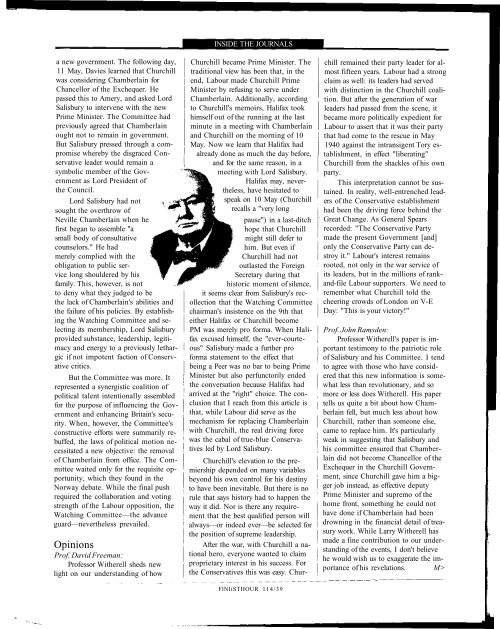Q - Winston Churchill
Q - Winston Churchill
Q - Winston Churchill
- No tags were found...
Create successful ePaper yourself
Turn your PDF publications into a flip-book with our unique Google optimized e-Paper software.
a new government. The following day,11 May, Davies learned that <strong>Churchill</strong>was considering Chamberlain forChancellor of the Exchequer. Hepassed this to Amery, and asked LordSalisbury to intervene with the newPrime Minister. The Committee hadpreviously agreed that Chamberlainought not to remain in government.But Salisbury pressed through a compromisewhereby the disgraced Conservativeleader would remain asymbolic member of the Governmentas Lord President ofthe Council.Lord Salisbury had not , «sought the overthrow ofNeville Chamberlain when hefirst began to assemble "asmall body of consultativecounselors." He hadmerely complied with theobligation to public servicelong shouldered by hisfamily. This, however, is notto deny what they judged to bethe lack of Chamberlain's abilities andthe failure of his policies. By establishingthe Watching Committee and selectingits membership, Lord Salisburyprovided substance, leadership, legitimacyand energy to a previously lethargicif not impotent faction of Conservativecritics.But the Committee was more. Itrepresented a synergistic coalition ofpolitical talent intentionally assembledfor the purpose of influencing the Governmentand enhancing Britain's security.When, however, the Committee'sconstructive efforts were summarily rebuffed,the laws of political motion necessitateda new objective: the removalof Chamberlain from office. The Committeewaited only for the requisite opportunity,which they found in theNorway debate. While the final pushrequired the collaboration and votingstrength of the Labour opposition, theWatching Committee—the advanceguard—nevertheless prevailed.OpinionsProf. David Freeman:Professor Witherell sheds newlight on our understanding of howINSIDE THE JOURNALS<strong>Churchill</strong> became Prime Minister. Thetraditional view has been that, in theend, Labour made <strong>Churchill</strong> PrimeMinister by refusing to serve underChamberlain. Additionally, accordingto <strong>Churchill</strong>'s memoirs, Halifax tookhimself out of the running at the lastminute in a meeting with Chamberlainand <strong>Churchill</strong> on the morning of 10May. Now we learn that Halifax hadalready done as much the day before,and for the same reason, in ameeting with Lord Salisbury.Halifax may, nevertheless,have hesitated tospeak on 10 May (<strong>Churchill</strong>recalls a "very longpause") in a last-ditchhope that <strong>Churchill</strong>might still defer tohim. But even if<strong>Churchill</strong> had notoutlasted the ForeignSecretary during thathistoric moment of silence,it seems clear from Salisbury's recollectionthat the Watching Committeechairman's insistence on the 9th thateither Halifax or <strong>Churchill</strong> becomePM was merely pro forma. When Halifaxexcused himself, the "ever-courteous"Salisbury made a further proforma statement to the effect thatbeing a Peer was no bar to being PrimeMinister but also perfunctorily endedthe conversation because Halifax hadarrived at the "right" choice. The conclusionthat I reach from this article isthat, while Labour did serve as themechanism for replacing Chamberlainwith <strong>Churchill</strong>, the real driving forcewas the cabal of true-blue Conservativesled by Lord Salisbury.<strong>Churchill</strong>'s elevation to the premiershipdepended on many variablesbeyond his own control for his destinyto have been inevitable. But there is norule that says history had to happen theway it did. Nor is there any requirementthat the best qualified person willalways—or indeed ever—be selected forthe position of supreme leadership.After the war, with <strong>Churchill</strong> a nationalhero, everyone wanted to claimproprietary interest in his success. Forthe Conservatives this was easy. Chur-FlNIiSTHOUR 114/39chill remained their party leader for almostfifteen years. Labour had a strongclaim as well: its leaders had servedwith distinction in the <strong>Churchill</strong> coalition.But after the generation of warleaders had passed from the scene, itbecame more politically expedient forLabour to assert that it was their partythat had come to the rescue in May1940 against the intransigent Tory establishment,in effect "liberating"<strong>Churchill</strong> from the shackles of his ownparty.This interpretation cannot be sustained.In reality, well-entrenched leadersof the Conservative establishmenthad been the driving force behind theGreat Change. As General Spearsrecorded: "The Conservative Partymade the present Government [and]only the Conservative Party can destroyit." Labour's interest remainsrooted, not only in the war service ofits leaders, but in the millions of rankand-fileLabour supporters. We need toremember what <strong>Churchill</strong> told thecheering crowds of London on V-EDay: "This is your victory!"Prof. John Ramsden:Professor Witherell's paper is importanttestimony to the patriotic roleof Salisbury and his Committee. I tendto agree with those who have consideredthat this new information is somewhatless than revolutionary, and somore or less does Witherell. His papertells us quite a bit about how Chamberlainfell, but much less about how<strong>Churchill</strong>, rather than someone else,came to replace him. It's particularlyweak in suggesting that Salisbury andhis committee ensured that Chamberlaindid not become Chancellor of theExchequer in the <strong>Churchill</strong> Government,since <strong>Churchill</strong> gave him a biggerjob instead, as effective deputyPrime Minister and supremo of thehome front, something he could nothave done if Chamberlain had beendrowning in the financial detail of treasurywork. While Larry Witherell hasmade a fine contribution to our understandingof the events, I don't believehe would wish us to exaggerate the importanceof his revelations. M>

















